nature installation at Art Basel | Rundhof and Enea Lounge, Floor 2, Hall 2
Continuing the partnership with Art Basel in Basel in 2019, Enzo Enea creates a space for refuge and contemplation of nature with his latest installation Isle of Trees.
In today’s world, green spaces are disappearing at a rapid pace, especially in our urban environments, making the care of these spaces even more important. Isle of Trees showcases both endangered and resilient tree species, and demonstrates how appropriate plants can be used to counteract the effects of climate change and the urban heat island. Through this curated combination of native tree specimens, a mixed forest installation encloses the circular courtyard in a microcosm. Here, visitors can relax, feel, see, breathe, and perceive the microclimate created beneath the treetops.
Isle of Trees is open to all Art Basel visitors, inviting them to immerse themselves in this unique installation and reflect on the value that these urban green spaces have for both people and the environment.

The trees
The nature installation Isle of Trees consists of three European beeches, seven Persian Ironwood trees, five pines and twenty Bald Cypresses. The largest trees are also the oldest and symbolize the past. The European beeches do not well tolerate the rising temperatures and the resulting longer periods of drought. Today, European beeches are already disappearing from the cityscape and their population in the forests is decreasing. Older trees usually have a greater capacity to absorb carbon dioxide (CO2) and release oxygen (O2) into the atmosphere. Therefore, Enzo Enea is particularly committed to old trees by giving them a new home – among others – in the Tree Museum.
The smaller trees represent the future: the Bald Cypress thrives in water and is able to withstand flooding or heavy rain. The roots contain a spongy tissue that allows better aeration in water.
Another tree species is the Persian Ironwood tree. Its wood is so dense that it does not float and sink in water. The wood makes it robust against insects and fungi. Its resistance to heat and cold also distinguishes it. This makes the Persian Ironwood tree well prepared for temperature fluctuations that may occur as part of climate change.
The pines are found on nutrient-poor soils such as in the mountains. Due to its resistance to the cold, the pine tree is widely distributed within Europe in a wide range of climatic zones.
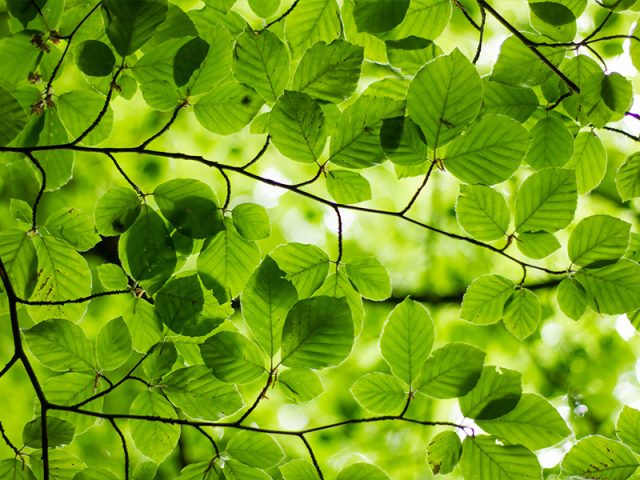
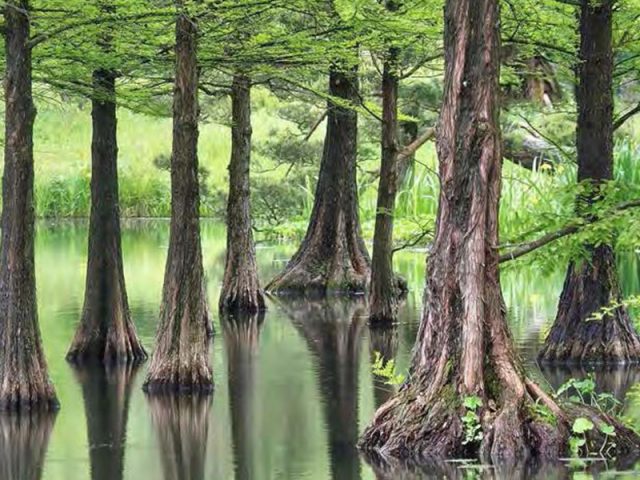
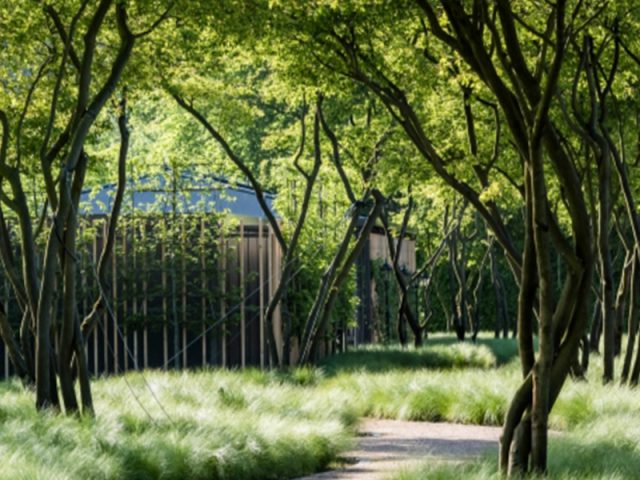
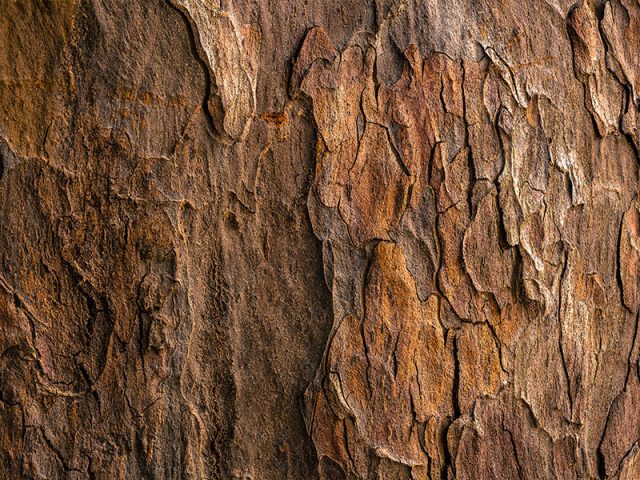
The microclimate
Do you know the pleasant feeling when you enter a forest? The air is pure, it is usually shady and pleasantly cool in summer. The so-called microclimate refers to a limited space such as the space between two buildings, a square or a stretch of road. Various influences shape the microclimate: the shade cast, the light and wind conditions, and the nature of the soil. The presence of trees and plants enhances it: the type and density of growing plants directly change the microclimate. The additional moisture and shade cast cool the environment. Therefore, the microclimate is of crucial importance for people’s quality of life.
With the nature installation Isle of Trees, Enzo Enea also makes us aware of the valuable properties of green areas. These are made perceptible for all visitors in the circular courtyard of Messe Basel.

The cocoa beans
Cocoa bean shells lie under the trees. The sweet scent is seductive. Despite the enveloping scent, the cocoa bean stands not only for the good life, but also for the monocultures of today. Intensive agriculture is destroying biodiversity on our planet.

Ghost fishing nets
Fishing nets are no longer made from the easily perishable natural materials (hemp, sisal or linen), but from synthetic materials such as polypropylene, polyethylene and nylon (polyamide). Lost nets take 400 to 600 years to rot at the bottom of the sea, contributing to the plastic pollution of our oceans. The ghost fishing nets destroy marine life and pollute the environment through microplastic that is produced during degradation.
The organisation Bracenet campaigns against ghost nets together with Healthy Seas, Ghost Diving and Nofir. Together they salvage the nets or take them directly from fishers. After cleaning, the nets are given a new life: by upcycling them by hand, new products are created in the Hamburg workshop, such as bracelets (Bracenets), key rings, dog leashes, etc.
More information on bracenet can be found here.
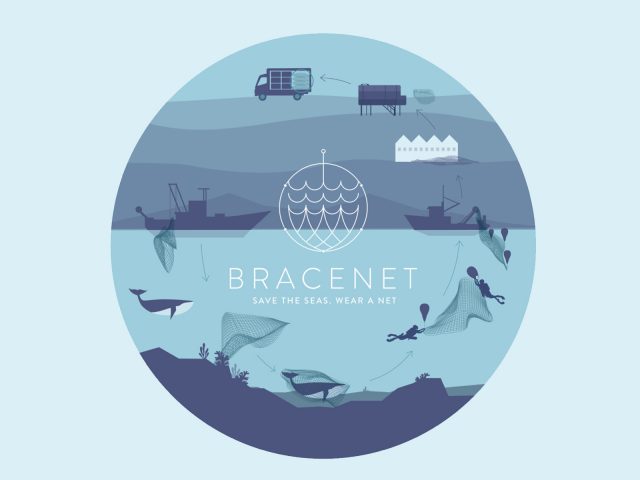
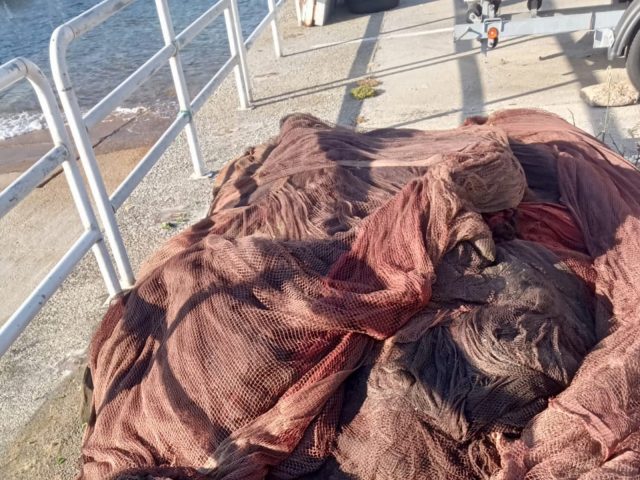
Paola Lenti
Since its foundation in 1994, the Italian company Paola Lenti has specialized in furniture and carpets for indoor and outdoor use. The high quality designs are available in a wide range of colors with exclusive design. The elegant collection, characterized by timeless elegance, exudes a relaxed and natural essence. From residential projects to the world of yachting and hospitality, the company has developed specific expertise over the years to ensure tailor-made solutions for every type of environment. Paola Lenti’s collections are distributed in over 60 countries in around 300 of the most important international showrooms.
The collaboration between Enea and Paola Lenti is based on shared principles of ethics and social responsibility: both have invested energy and resources for a greater sustainability and respect for the environment, convinced that only a healthy ecosystem can contribute positively to people’s quality of life
For more information about Paola Lenti, click here.
Watch the Video “Clues in the garden” by Paola Lenti.



